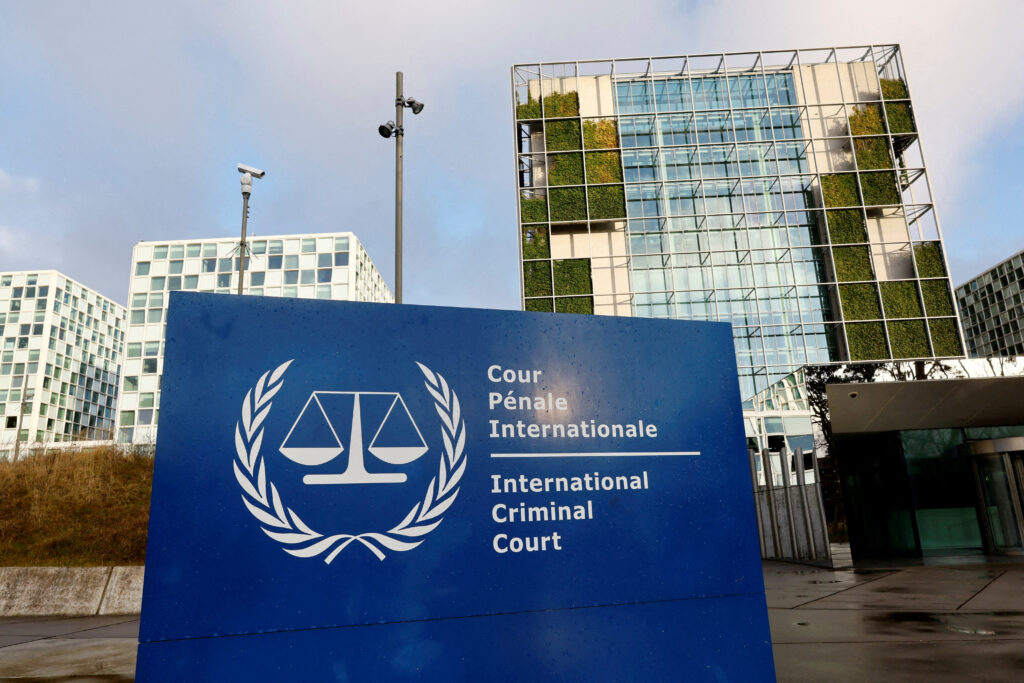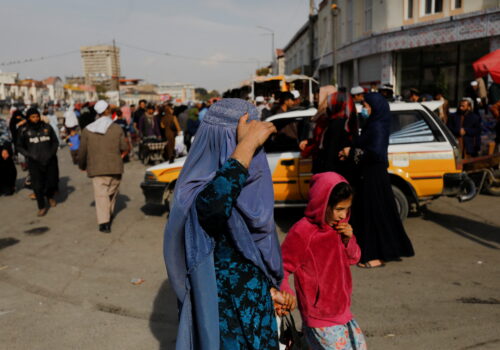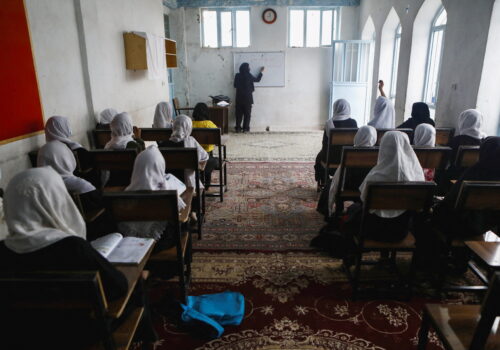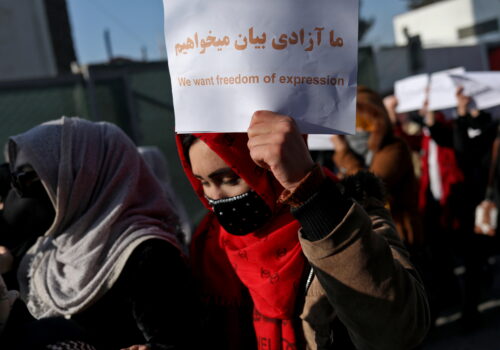Is the tide turning for justice? On Tuesday, the International Criminal Court (ICC) in The Hague issued arrest warrants for the Taliban’s supreme leader, Hibatullah Akhundzada, and the group’s chief justice, Abdul Hakim Haqqani, for crimes against humanity of persecution against women, girls, and others. Since retaking the country in August 2021, the Taliban has imposed strict controls on women and girls through repressive decrees and brutal enforcement, with no sign of easing up. To answer our burning questions about these warrants, we turned to our experts on international law and gender apartheid.
1. What do we know about the Taliban leaders targeted by the ICC?
Akhundzada has been supreme leader of the Taliban since 2016. A reclusive figure, he has maintained a low public profile, rarely appearing in media and seldom leaving his stronghold in southern Afghanistan. He joined the Taliban in 1994 and quickly ascended its ranks, serving in various judicial and religious roles. During the Taliban’s initial rule (1996–2001), he was appointed chief justice of the Sharia Courts, where he reinforced the Taliban’s repressive policies toward women and the broader population of Afghanistan. Since the Taliban’s renewed takeover of the country in August 2021, despite his limited public appearances, Akhundzada has issued more than one hundred decrees and edicts concerning the status of women and girls that systematically curtail their fundamental rights, institutionalizing a system of gender apartheid. Among the Taliban leaders, Akhundzada is infamous for his strict interpretation of Islamic law, leading to stringent policies, including the banning of girls’ education beyond sixth grade and the reintroduction of public executions and floggings.
Haqqani is affiliated with the Dar-ul Uloom Haqqania, a powerful Deobandi madrassa in Pakistan, (not to be confused with the Haqqani Network, the military faction of the Taliban). He led the Taliban’s negotiating team during the Doha peace talks in 2019-2021 and is among the Taliban’s highest-ranking religious figures. He shares similar religious views as Akhundzada and has played a key role in drafting and interpreting the Taliban’s legal and judicial policies based on a strict interpretation of Sharia law. He has been influential in shaping ideological and legal decisions of the Taliban group, particularly those affecting the rights of women and girls.
—Azadah Raz Mohammad is a legal advisor to the Atlantic Council’s Strategic Litigation Project. She has worked on humanitarian and human rights–related projects in close collaboration with the Afghanistan Independent Human Rights Commission and the Afghan Ministry of Justice, among others.
2. What is the practical impact of these warrants for the Taliban?
The ICC’s announcement comes at a time when the international community has slowly started to normalize and accept the Taliban’s draconian regime. The request for arrest warrants is an important reminder to the international community about its obligation under international law conventions to tackle impunity and not to recognize the Taliban, whose members have been deemed criminal actors, as the legitimate government of Afghanistan. In addition, to fulfill its mandate, the ICC is dependent on the cooperation of its member states to implement the arrest warrants once they are issued. Members of the international community should assist the court in arresting the alleged perpetrators and fulfill their obligations under the Rome Statute so that justice can be served.
The arrest warrants are a good start, but the ICC should do more—expeditiously pursue charges against more senior Taliban leaders, expand the scope of charges to include the full panoply of crimes against humanity and war crimes that have been committed in Afghanistan since 2003 (when it became a state party to the Rome Statute), including the concept of gender apartheid.
—Azadah Raz Mohammad
3. What impact will this have for women and girls in Afghanistan right now?
As we near the fourth anniversary of the Taliban’s takeover of Afghanistan, the arrest warrants offer a glimmer of hope after empty assurances, rhetorical condemnations, and elusive justice. It’s a first step to holding the Taliban to account, validating the tireless efforts of the women and girls of Afghanistan to document, resist, and dismantle the Taliban’s systematic gender-based oppression. The immediate impact isn’t just symbolic solidarity. The finding that there are reasonable grounds to believe that the crime against humanity of persecution is being perpetrated paves the way not just to potential individual criminal liability for Taliban leaders, but also the responsibility of other states, including in facilitating asylum and resettlement (as already determined by the European Court of Justice).
The women and girls of Afghanistan are not the only ones impacted. The Pre-Trial Chamber recognized a broad scope of victims, including LGBTQI+ persons. This is a watershed moment in international criminal law: the first time that an international tribunal has confirmed that gender persecution encompasses the protection of sexual orientation and nonconforming gender identities.
—Alyssa Yamamoto is a senior legal and policy advisor to the Strategic Litigation Project. She previously served as legal advisor to the United Nations special rapporteur on the promotion and protection of human rights while countering terrorism.
4. What’s next for the ICC case?
The next step is to wait for Akhundzada and Haqqani to turn themselves in to The Hague, or for a cooperating state to do so. Once the accused have made an initial appearance, then a confirmation of charges hearing would follow. The confirmation of charges document is ICC parlance for an indictment, and the hearing is a pretrial step that resembles a “mini-trial” before the trial. Should charges be confirmed against any of the accused, they would then appear for trial.
The key question is whether these arrest warrants can actually be enforced, given that Taliban leaders voluntarily turning themselves over is highly unlikely and their international travel ranges from limited to nonexistent. But politics can change and what was once viewed as impossible can quickly become possible. The handover of former Philippine President Rodrigo Duterte on crimes against humanity charges to the court earlier this year is a prime example of how shifting political winds can present opportunities to secure defendants in dockets.
While some courts of an international character or trying international crimes have held trials in absentia—which is how the Special Tribunal for Lebanon could try Hezbollah operatives or France could try a Mauritanian military officer for torture—the International Criminal Court requires physical presence at trial (with limited exceptions for virtual participation from disruptive defendants). However, the Appeals Chamber at the ICC recently upheld a Pre-Trial Chamber ruling that charges could be confirmed against notorious Ugandan warlord Joseph Kony even in his absence, and that the Rome Statute animating the ICC can do so where an accused has “fled or cannot be found.” Given that Akhundzada rarely leaves his stronghold in southern Afghanistan and his whereabouts are elusive, that may be an option that would at some point allow victims’ participation in court, should all other avenues of securing his presence in The Hague be exhausted.
—Gissou Nia is the director of the Strategic Litigation Project. She previously worked on war crimes and crimes against humanity trials at the International Criminal Tribunal for the former Yugoslavia and the International Criminal Court.
5. What’s next for activists and the international community?
Amid worrying movements towards legitimization and normalization of relations with the Taliban, activists should use the arrest warrants as both a guardrail and a galvanizing tool. The international community should unite in support for the arrest warrants, including their enforcement. But this is just one piece of the puzzle. The international community must also pursue the full panoply of justice avenues available to hold the Taliban to account, including universal jurisdiction cases, the potential International Court of Justice case, and ongoing efforts to accurately reflect in international law the totality of gendered harms being perpetrated, namely through codification of gender apartheid as a crime against humanity.
As the Pre-Trial Chamber has rightly articulated, at stake are “not only direct acts of violence, but also systemic and institutionalized forms of harm, including the imposition of discriminatory societal norms.” This is the crux of the Taliban’s existential project of domination that must be expressly named and squarely addressed in all justice and accountability efforts going forward.
—Alyssa Yamamoto
Further reading
Thu, May 29, 2025
How the Taliban is using law for gender apartheid, and how to push back
New Atlanticist By
To combat the Taliban’s institutionalization of gender apartheid, international actors must document the system of lawmaking that underpins the regime's human rights abuses.
Wed, Jul 2, 2025
How centering Afghan women and youth now can help challenge oppressive regimes in the future
Inside the Taliban's gender apartheid By
Empowered Afghan youth and women embody a future vision for the country rooted in rights, participation, and accountability.
Mon, Nov 25, 2024
A protester’s story from inside a Taliban prison
Inside the Taliban's gender apartheid By
Narges Sadat recounts the conditions she was forced to endure in a Taliban prison for protesting Afghanistan’s gender apartheid regime.
Image: A general view of the International Criminal Court in The Hague, Netherlands, March 12, 2025. REUTERS/Wolfgang Rattay.




